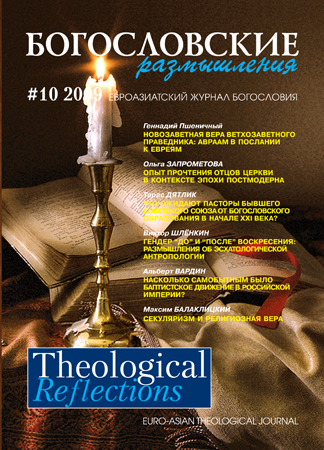What Expectations do Pastors and Local Churches in the Former Soviet Union have of Higher Theological Education at the Beginning of the 21st Century?
Keywords:
Pastors, Higher Theological EducationAbstract
The purpose of this article is to draw the attention of theological educators to the expectations and feelings of local church pastors concerning formal theological education in order to stimulate constructive dialogue on both sides. The article represents a general description of the results of a qualitative survey of seventy pastors from five regions of the former Soviet Union conducted by Donetsk Christian University from 2005-2007 as part of its strategic planning process. No statistics are given in order to direct the reader's attention specifically to the questions and expectations of pastors. In the process of interviewing each pastor, the following five questions were asked: (1) What is the basic purpose for the existence and functioning of a higher theological institution (2) What programs would the pastor like to see in a theological school? (3) What qualities would he like to see in a student? (4) What, in the pastor's opinion, should the graduate of a theological program be like? (5) What qualities should characterize an instructor in a higher theological institution?References
- Craig, William Lane and Paul Gould, eds. The Two Tasks of the Christian Scholar: Redeeming the Soul, Redeeming the Mind. Crossway Books, 2007.
- Diekema, Anthony. Academic Freedom and Christian Scholarship. Wm. B. Eerdmans Publishing Company, 2000.
- Dockery, David and David Gushee, eds. The Future of Christian Higher Education. Broadman and Holman Publishers, 1999.
- Holmes, Arthur Frank. Building the Christian Academy. Wm. B. Eerdmans Publishing Company, 2001.
- __________. The Idea of a Christian College. Wm. B. Eerdmans Publishing Company, 2000.
- Henry, Douglas and Bob Agee, eds. Faithful Learning and the Christian Scholarly Vocation. Wm. B. Eerdmans Publishing Company, 2003.
- Hughes, Richard. The Vocation of the Christian Scholar: How Christian Faith Can Sustain the Life of the Mind. Wm. B. Eerdmans Publishing Company, 2005.
- Marsden, George. The Outrageous Idea of Christian Scholarship. Oxford University Press, 1997.
- Sire, James. Habits of the Mind: Intellectual Life as a Christian Calling. InterVarsity Press, 2000.
- The Effectiveness of Theological Education in Ukraine: A Research Project. Odessa: EAAA, 2007.
Downloads
How to Cite
Issue
Section
License
Copyright (c) 2020 Taras DYATLIK

This work is licensed under a Creative Commons Attribution-NonCommercial 4.0 International License.
All articles published in the Journal are distributed under a Creative Commons Attribution-NonCommercial 4.0 International License
By submitting an article for publication in Theological Reflections: Eastern European Journal of Theology the author grants the editors the right to publish the article and distribute it in electronic and print form.
The author reserves all copyrights and the right to use the materials of the article in whole or in part for educational purposes, to write his own dissertations, to prepare abstracts, conference reports, oral presentations, etc., as well as post electronic copies of articles (including the final electronic version downloaded from the journal’s official website) on non-commercial web-resources without the consent of the editorial board and founders.



